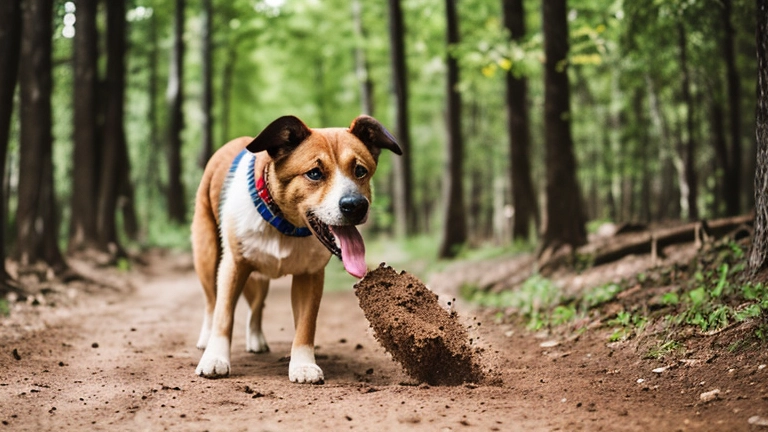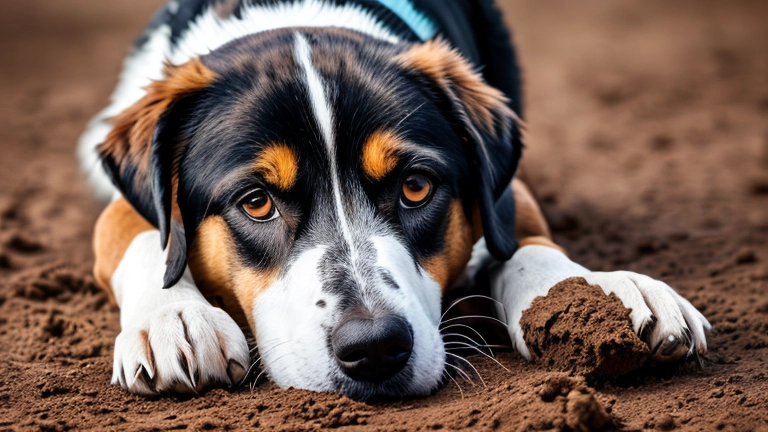Table of Contents
INTRODUCTION
You may have wondered why is my dog eating dirt over their tasty food if you’ve ever seen them eating on it. Seeing your dog engage in this unusual behavior might be startling and even irritating. A little curiosity is OK, but eating dirt on a regular basis might be more than a strange habit. This behavior, called “pica,” can rarely show underlying problems, such as nervousness, eating lacks, or even health difficulties.
In this article, we’ll look at some causes of dogs eating dirt, determine if it’s a serious issue, and discuss what you can do to stop this practice. You may improve your dog’s general health and wellbeing without giving them dirt by learning about the source causes and finding the signs to look out for. Let’s study why certain dogs are attracted to dirt and how to deal with this leaning.

Why Is My Dog Eating Dirt Outside?
Dogs are naturally interested creatures who normally study their setting with their jaws. When your dog starts eating dirt, it might be confusing and a little about.
Common dirt eating, or “pica,” may show a more serious problem than the chance taste of soil.
This motion may be the result of health issues, boredom, or eating lacks. Finding the causes of this behavior will help you deal with it more well.
In this post, we’ll look at the reasons behind dogs eating dirt, possible risks, and ways to support your pet stop doing so. Let’s get started and make sure your dog is clean, safe, and healthy!
Why Is My Dog Eating Dirt?
Your dog may be eating dirt for a number of reasons. It may be a behavior problem in certain conditions or a sign of a medical issue in others. Here are some common reasons why your dog might choose to eat dirt as a food.
Causes of Dirt-Eating
Nutritional Deficiencies:
Similar to us, dogs may have food desires when they are short in certain nutrients. A dog may naturally go for unusual objects, like dirt, to satisfy its nutritional needs if its food is short in important vitamins or minerals. This behavior can result from mineral lacks, such as those in calcium, magnesium, or iron. Furthermore, a dog’s health depends on important vitamins, such as vitamin B, and a lack may cause your pet to pursue out ways to get these nutrients on its own.
It’s vital to give your dog a balanced meal full of best nutrients to help stop them from eating dirt. It is sensible to speak with your vet if you believe that your dog’s dirt-eating behavior is caused by a lack. To meet your dog’s specific nutritional demands, they may recommend eating changes, subject dog food, or specific supplements.
Underlying Health Conditions:
A dog’s partiality to portion dirt may rarely be a sign of a unseen medical condition. In trying to relieve their worry, your dog may eat soil if they have digestive issues, anemia, or certain metabolic diseases.
Dogs with anemia, for example, lack enough red blood cells to carry oxygen efficiently, which causes tiredness and other health issues. Dogs may naturally option to eating dirt in their fight, but this doesn’t really promotion their settings.
It’s vital to see a vet if you notice that your dog is always eating dirt and revealing other signs of disease, such as reduced energy, changes in taste, or weight loss. Early finding of any underlying medical issues can be important for regulatory or even withdrawing these conditions before they spiral.
Gastrointestinal Obstruction:
Rarely, dogs might eat dirt as a response to gastrointestinal worry. If they’re. They may turn to dirt in an effort to find relief from stomach worry, such as swelling or other types of upset stomach.
Although this activity is natural, if the dirt creates more blocks, it may actually make their signs worse. Eating dirt while already experiencing a block may cause a malicious cycle in which the block worsens and may even result in serious digestive problems.
Contact your vet right away if you notice your dog not only eating dirt but also showing other signs of worry, such as pacing, grumbling, or a curved attitude. Action may be necessary for a blockage, and early action can stop later, more complex (and expensive) acts.
Why Your Dog Shouldn’t Eat Dirt
A little dirt here and there might not seem dangerous, but eating dirt on a regular basis might have serious significances. Let’s study some of the key advices for why you should avoid dirt-eating as a habit.
Parasite Ingestion:
Roundworms, hookworms, and whipworms are among the dangerous pests that can be found in soil. Dogs who eat dirt run the danger of intense these pests, which can main to poisons and other health issues. Signs of parasitic poisons can include fatigue, vomiting, diarrhea, and weight loss.
Contact to Poisons and Chemicals:
The soil your dog is eating may contain deadly matters, peats, pesticides, or other dangerous mixtures, depending on where they are. Poisoning, which results from eating these drugs, can cause signs that range from minor sickness and vomiting to serious organ damage.
Risk of Gastrointestinal Blockage:
Large amounts of dirt eating, mainly when combined with rocks or sticks, can clog the intestinal system. Surgery is often needed to clear blockages, which can be expensive for you and upsetting for your dog.
Damage to Teeth and Gums:
Eating on rough or hard soil, especially if it contains sands, might damage your dog’s gums or wear down their teeth. Eating may become raw as a result of this damage, and dental care may be needed.
It is important to closely display your dog and take defenses against dirt-eating because of these risks.
How to Prevent Your Dog from Eating Dirt
Thankfully, there are some methods you may service to stop or at least reduce your dog’s dirt-eating bents. Here are a few successful strategies:
Proper Diet:
One of the greatest methods to deal with dirt-eating in dogs is to make sure their diet is nutritionally enough. To ensure that the food you’re giving your dog pleases all of his nutritional needs, speak with your vet. Your vet may suggest shift to a best dog food or even adding extras to your dog’s diet if they are lacking in certain exact nutrients. Getting a modified drug is useful because certain dogs may have special nutritional wants depending on their age, breed, or health situation.
By keeping your dog full and content throughout the day, offering them smaller, more common meals can sometimes help reduce the desire to eat dirt.
Supervised Walks:
Watch for any attempts by your dog to eat dirt while you’re outside. Sending their focus away from soil can be realized with a strict yet feeling order, such as “leave it.” To provide a positive extra, bring along a favorite toy or some snacks. Sometimes, just being there and interacting with your dog while they’re outside can make them less involved in eating dirt since they’re more involved in playing or mixing with you.
Try to distract your dog’s interest with a fun activity or toy if you see them start to eat dirt. Since dogs are usual, you can slowly teach them that there are more pleasant things to do than worrying on dirt.
Falling Anxiety and Boredom:
Dogs may start eating dirt because they are bored, anxious, or stressed. Try to find possible activates if you believe your dog’s dirt- eating may be behaviorally moved. For example, while some dogs may become nervous when left alone, others may become nervous by loud noises or specific situations.
Include mystery feeders, interactive toys, and training activities in your dog’s daily routine to keep them interested and less bored. Try to give them at least one or two walks each day or a fun play session to keep them active and content because physical activity is equally vital. For more direction, speak with a canine behaviorist or your vet if worry appears to be a major causal issue.
Conclusion
Dog owners may be confused and worried by their dog’s dirt-eating partiality. You can take action to successfully address this habit by being aware of the possible causes. There are some strategies to stop your dog from looking for soil, reaching from making sure they eat a stable diet to nursing their walks and sinking their worry levels. Even if the chance taste of dirt might not be harmful, eating dirt on a regular basis might be harmful to your health, therefore it’s best to take blocking actions.
It’s sensible to speak with your vet if you’ve tried the above-mentioned strategies and your dog is still eating dirt. An expert can promotion in ruling out any underlying medical conditions and might make additional references based on your dog’s particular foods. You can promotion your dog breaking the dirt-eating habit and have a happier, healthier life if you are patient, understanding, and active.
FAQs
1. Is it normal for dogs to eat dirt rarely?
Indeed, it is common for dogs to plug on dirt from time to time, mainly when they are nosy or travelling their settings. Dirt-eating may, however, be a sign of a more serious problem, such as a behavioral issue, health issue, or eating shortage, if it becomes a habit.
2. Can eating dirt harm my dog?
Yes, eating dirt on a regular basis can be dangerous. In addition to revealing your dog to dangerous germs, poisonous chemicals, and possible pests, eating dirt can cause dental problems or gastrointestinal blocks. To address the behavior and avoid health risks, it’s a good idea to see a vet if your dog often eats dirt.
3. What should I do if my dog suddenly starts eating dirt?
Your dog may have a new problem, like a health state or strain-related behavior, if they start eating dirt out of the blue. Start by sighted if their setting, behavior, or food have changed just. It’s a good idea to speak with a vet because they can rule out medical settings and offer advice on any eating or care changes that may be needed.
4. Could my dog’s diet be causing them to eat dirt?
Indeed, a poor or unbalanced diet lacking in vital nutrients may lead to dirt-eating since your dog may naturally search for vitamins or minerals that are lost from the soil. Stopping this behavior needs feeding a healthful, well-balanced diet. A vet can assess your dog’s diet and suggest changes if you’re not sure if the food they’re eating now contents their nutritional wants.
5. How can I stop my dog from eating dirt?
The first step in depressing your dog from eating dirt is to keep an eye on them outside and switch them if they try. To avoid boredom or worry, you may also make sure their food is motivating and well-balanced by giving them toys, puzzle feeders, and regular playing. Refer a vet or dog behaviorist for more direction if the behavior continues.

Wonderful article